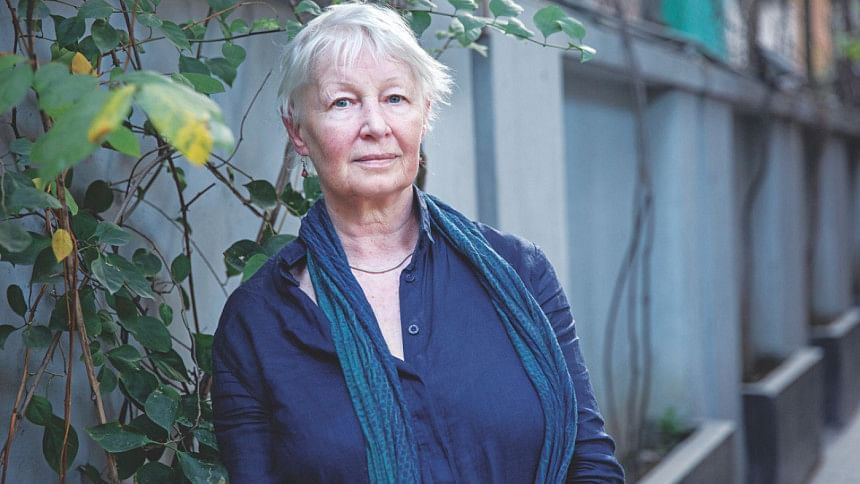JULIA SCARLETT LINDIG

Tell us something about yourself.
I'm sixty five years old. I learned ballet as a child, but used to mostly work as a theatre actor. When I had children, I realised that I had to change my job as I couldn't balance them both. Moreover, times were changing in Germany. Meaningful art forms didn't hold much value. My place wasn't there anymore, so I decided to quit. In the 90s, the internet was up and coming. So, I started a company, webdesign-berlin.de, which I run to this day. It's a small company, but we do all sorts of software and website development. Seven years ago, I started theatre work again, albeit in a different form. I started organising and producing plays in foreign countries with undereducated and less fortunate people. I started out this project in Kyrgyzstan with disabled people, who had no status there. I brought them up to a real stage, put the lights on them. People were shocked seeing disabled people on stage. It changed many people's perspectives, and encouraged other disabled people to show their talents, test themselves and gather more self-insurance. I also have a social foundation outside my work, 17heroes.net.
What inspired you to bring disabled people into the spotlight?
When I went to Kyrgyzstan, I was baffled seeing that some people were being treated worse than animals. I wanted to do something for them. As my profession is theatre, it struck me that when someone is on the stage, and the lights focus on them, you can discover their true beauty because your complete attention is on them. So, I decided to take this course of action.
Was it difficult for them to cope up with the art of theatre as they had no prior experience with it?
Not at all. We started training with them, and as we are very experienced, we could handle all the important issues quickly. We did awareness and team work with them as well.
Have you seen the theatre in Bangladesh, and what are your thoughts on it?
Yes I have. It's very different from ours, but I really enjoy it. I'm quite fascinated about the richness of the different forms of theatre Bangladesh has to offer.
Have you thought about bringing the spotlight here?
There is a big chance of me working with Bangladesh Institute of Theatre Arts (BITA). They go to schools, and use theatre as a form of education. I believe that this is needed here more, rather than putting someone on stage. Kyrgyzstan has a small population, so a lot of people can come and watch the plays. That's not really possible here. My special work is going to the schools, especially slum schools, and teaching them to concentrate on themselves, and be aware that they can change their own lives, without having to follow orders blindly. Of course, education is very important, but the first step should be to make the children understand that they are unique individuals, and if they have a dream, they should follow it. Our task here is to empower the children, and make them capable of doing their own things.
Are there any dancers you admire? How did you learn ballet?
I admire a lot of dancers as this work is incredibly difficult. To be good in dancing, you have to concentrate a lot on your work. There were five women in our house – my mother, my three sisters and I. My mother was a dancer, and she made us work three hours a day at the ballet school she had. We used to go there after school, and train for three hours, no questions asked. We had to do it, whether we wanted to or not. Then, we were free to do whatever we wanted.
Have you met any prominent faces down the line of your work?
I've met Wim Wenders, but only privately. I didn't have the chance to work with him. However, I've worked with Tom Tykwer. I've had the opportunity of working with many talented directors.
There was this stereotype that fine arts or ballet are only for girls. Do you think it still exists now?
It does. Maybe it's because dancing is considered to be something feminine, and many dancers have strong feminine sides. They have to be able to relax their muscles and be flexible, otherwise, they wouldn't be able to respond to the music fully.
What do you love most about Bangladesh?
The pollution and the traffic are terrible, but the chaos and the ability to improvise are very valuable things in Bangladesh. BITA has a training centre in Patiya, and I love visiting that place. We go there sometimes to concentrate and talk to each other. In my next working period here, we will take some teachers with us, and talk to them about how to make the children think creatively, and change the education system.
What is your greatest achievement?
Perhaps having children (laughs). For a period of time, I had a puppet theatre, and it was wonderful. It's such a small form of art with so many possibilities. I love puppets, and love playing with them. Now that I'm working in slum schools with BITA, I get to work with puppets again.
What is your motto in life?
I think it is to work with interesting people on interesting issues. That's my motto.
Do you have any special message for the readers?
I'd say to live your own life to the fullest, and to not get too influenced by outsiders.

 For all latest news, follow The Daily Star's Google News channel.
For all latest news, follow The Daily Star's Google News channel. 



Comments